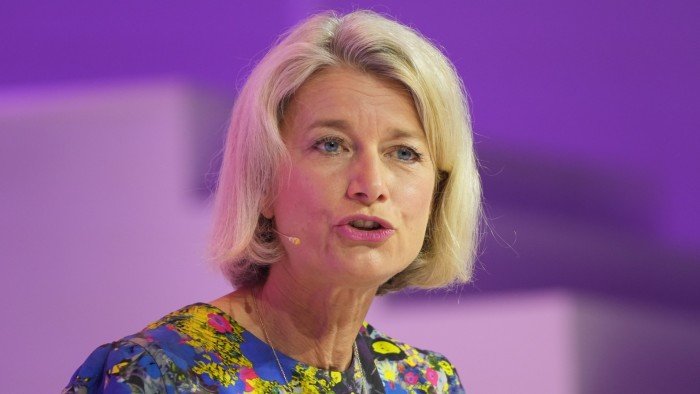Unlock the Editor’s Digest for free
Roula Khalaf, Editor of the FT, selects her favourite stories in this weekly newsletter.
Eutelsat, the heavily indebted owner of Starlink rival OneWeb, has replaced its chief executive, paving the way for the French government to bolster the satellite operator’s stretched finances.
The company on Monday said its board had voted to appoint Jean-François Fallacher, head of the French division of telecom operator Orange, to replace Eva Berneke, who had been Eutelsat chief executive since 2022.
In a LinkedIn post announcing her departure, Berneke said the company was looking “to adjust our governance and shareholder structure”.
A French official confirmed that the government was looking at options to finance the future of Eutelstat, including increasing its 13.6 per cent stake. However nothing was yet decided, the official said.
Berneke’s departure and a new business plan was the price of government support, according to one person close to the subject.
Eutelsat shares closed up 12.5 per cent at €4.50.
If France decides to inject funding via an equity issue, this could dilute the UK government’s 11 per cent stake and the 24.1 per cent holding of India’s Bharti Global: the result of their $1bn rescue of OneWeb from bankruptcy in 2020.
OneWeb currently has the second largest constellation providing broadband services from low Earth orbit, with about 650 satellites compared with Starlink’s more than 7,000.
But Eutelsat is facing considerable financial pressure as it struggles to renew ageing OneWeb satellites fast enough to compete with Starlink and Amazon’s Project Kuiper, which plans a network of more than 3,000 spacecraft.
It will also have to stump up more than €2bn in investment for Europe’s sovereign low Earth orbit constellation Iris² towards the end of the decade.
The company has been slower than expected to generate revenues from OneWeb, which it acquired in 2023, after difficulties in rolling out ground stations.
Customer interest in OneWeb has soared since the US threatened to withhold Elon Musk’s Starlink from Ukraine in negotiations over a ceasefire with Russia earlier this year.
Musk has said this would not happen, but the threat has focused attention on the risks of relying on the billionaire’s network.
Revenues will take time to come in, however, making it necessary for Eutelsat to find a new source of financing. “There could be a hole that will need to be addressed,” another French official told the Financial Times before Monday’s announcement.
At its half-year results in February, the group said it was “actively working on a financing plan in line with our strategic road map and longer term leverage objective”. This included bringing down the ratio of net debt to ebitda from just under four times to three.
However in March, rating agency Fitch downgraded Eutelsat further into junk territory, reflecting slower than anticipated revenue growth from OneWeb, its investment requirements, and continued pressure in its core video broadcast business from satellites in a higher geostationary orbit.
The rating agency said Eutelsat was facing “a likely need for substantial external funding” to meet refinancing needs from 2027.
Discussions between the company and its shareholders about its financing requirements have been under way for several weeks. The discussions were first reported in French media last month.
The appointment of Fallacher, who will take up his post in June, comes as the group is searching for a new chair to replace Dominique D’Hinnin, who announced his retirement earlier this year as part of a board restructuring.
One candidate for that role is Michel Combes, a former executive at Eutelsat shareholder SoftBank, who joined the board in February, one person familiar with the matter said.
Additional reporting by Lucy Fisher in London
